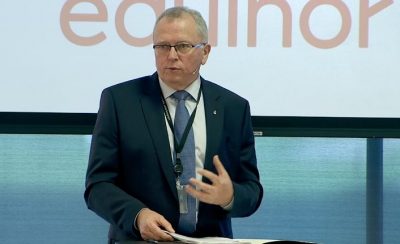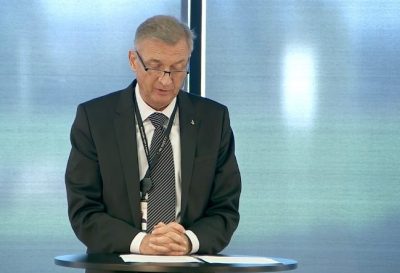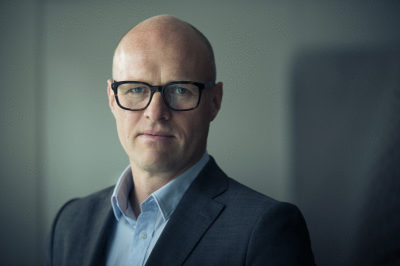UPDATED: Members of the Norwegian Parliament will be summoning leaders of shamed state oil company Equinor, along with former oil ministers, to a committee hearing on huge losses at Equinor’s US operations. Results of a new probe into the losses reveal a lack of management control and poor follow-up when problems were pointed out by internal auditors over the past six years.

A parliamentary hearing on Equinor’s roughly NOK 200 billion in US losses over the past 20 years was supposed to have been held this week. Now, in the wake of accounting firm PwC’s new report on the losses, the hearing is being both postponed and expanded, in order for all involved to better prepare themselves.
Equinor’s already-outgoing chief executive Eldar Sætre and board leader Jon Erik Reinhardsen will be “invited” to testify at the hearing, as will Sætre’s predecessor Helge Lund. It was Lund who initiated Equinor’s expansion into North America more than 10 years ago and into various controversial land-based oil projects like tar sands in Canada and fracking in the US. Both led not only to serious environmental and climate concerns but also to heavy losses for the offshore company (then called Statoil), which had little experience in land-based oil exploration and production.
The PwC report, ordered by Equinor itself to help the company determine what went wrong, also reveals how Lund and his colleagues’ decision to acquire shale oil company Brigham Exploration in 2011 was based on their mistaken belief that oil prices would remain at around USD 125 a barrel for the next 10 years. Just three years later, oil prices crashed and have only briefly recovered to even half that level. They’re now trading at less than USD 43 a barrel.

Lund left then-Statoil that same year, in 2014, and has defended his record but is now widely viewed as having taken on way too much risk for Statoil, along with losing top management control over how the US operations were being run. “We have had large economic losses,” admitted Reinhardsen at a press conference when PwC’s crusing report was released on Friday. “The investments (in the US) weren’t robust when the oil price fell. We have had major internal control challenges that should have been discovered earlier.” CEO Sætre appeared chasten as well: “For us in Equinor, and for me, this report makes for tough and demanding reading. It describes a period in our history when a lot was invested on land in the USA that suffered great economic losses.”

Internal auditors started issuing warnings years ago, especially when oil prices first collapsed in 2014, but they were largely contested or ignored even though 17 of 44 reports on the US operations were listed as “red,” indicating serious trouble afoot that demanded direct attention from both top management and the board. The PwC report confirms major conflicts, however, between the internal auditors and the management of the operations the auditors were most concerned about. That’s not unusual, the report notes, but relations were so bad that they became “counterproductive.” At one point, relations between the head of US operations Torgrim Reitan and internal auditors examining those operations became so difficult that the head of Equinor auditing committee had to mediate.
PwC’s and Equinor’s press conference was held just when other major breaking news in Norway, like the annual announcement of the Nobel Peace Prize on Friday and even the hospitalization King Harald V, might have taken attention away from it. The report nonetheless grabbed media coverage through the weekend, with commentators also highlighting how Statoil/Equinor failed to follow up on internal auditors’ warnings about the losses that also sparked internal conflicts.
The company had allegedly tried to cover up or at least downplay the US losses by lumping them together with results from all international operations. Statoil/Equinor leaders refused analysts’ and regulators’ requests to break out the US results, until finally giving in last spring after newspaper Dagens Næringsliv (DN) revealed the extent of the losses in embarrassing detail and top politicians reacted right away. Author Aage Borchgrevink had already reported an estimated NOK 140 billion worth of writedowns on international expansion in his book that marked the Norwegian oil industry’s 50th anniversary last fall. DN could later report NOK 200 billion on US operations alone.
Lund and other Statoil/Equinor leaders have continued to blame the losses mostly on the fall in oil prices, while Borchgrevink and DN have pointed to various projects that veered out of control, along with a work culture in the US characterized by big-spending, high executive salaries and relatively lavish lifestyles (called an ukultur in Norwegian). PwC’s report confirms that a lack of cost control in the US cost Statoil/Equinor at least USD 100 million, or around NOK 1 billion, alone.
At stake now is public and political confidence in Norway’s biggest company, of which the state still owns 67 percent. While Statoil/Equinor’s management and board are ultimately responsible, questions have also risen over why the government’s oil ministry (technically the company’s biggest shareholder) never detected the losses or raised questions themselves. The upcoming hearing will also call in oil ministers over the past decade or more, when the US expansion was at its height, since the losses started or continued on their watch.
Current Oil Minister Tina Bru of the Conservative Party, who just took over the position in January, has claimed she and her colleagues were unaware of the extent of the losses. She has already scolded Equinor for not being more open about their US operations and losses, but she also told Parliament in June that the company was “cleaning up” the mess in the US and that its internal controls had become much better than they were when the first internal alarms were sounded from 2014 and onwards.

Not true, reported DN last week, citing another critical report from Equinor’s own internal auditors delivered just last year. That indicates the alleged “clean-up” is far from over, not least because of a reported ongoing lack of control over purchasing processes.
Equinor’s US “scandal” has created a “crisis in confidence” for Equinor, wrote DN political commentator Frithjof Jacobsen on Saturday: “They’re suffering from a lack of confidence within the Parliament, in the government and in Norway in general. Their attempt to give the impression that their clean-up job was completed, and that the high lives Equinor’s men in the US lived shouldn’t be tied to the losses, weakens confidence even more.”
Jacobsen and others have also claimed that Equinor leaders and especially their so-called communications experts tried hard to hide their enormous losses, but won’t be allowed to any longer. He claims Equinor now has “a considerable credibility problem,” but top management may walk away unpunished. Former CEO Helge Lund is long gone, and now making millions in other ventures. Current CEO Eldar Sætre is retiring after spending his entire career at Statoil/Equinor. He will officially be replaced by aother company veteran, Anders Opedal, on November 2. Bru herself has stated earlier that she retained confidence in Equinor’s board.
Questions over consequences
PwC’s report, paid for by Equinor, may help exonerate those responsible as well. The PwC accountant who led the team probing Equinors losses, Eli Moe-Helgesen, said at Friday’s press conference that “the challenges (at Equinor) have been complex and there are no single events or individuals behind them.”
Allegations that “no single events or individual” are at fault can help managers, who were supposed to be responsibile, avoid being held accountable. Instead, as they’re already saying, they instead promise to “learn from the experience,” and intend to carry with the exception of the retiring Sætre who’ll leave Equinor with an estimated NOK 100 million worth of pension benefits.
The failure to hold any single events or individuals accountable echoes a similarly crushing but company-paid report on the recent scandals at shipping and cruise company Hurtigruten, which its CEO and board have so far survived. Even though top management at Hurtigruten failed to ensure good internal communication channels and the safety of hazardous cruises during Corona times, there have been no top executive personnel changes even after heavy losses, illness and at least one death.
The lack of consequences for those now involved in what’s been called Norway’s biggest industrial scandal ever, at Equinor, angers Norwegians like commentator Bjørn G Sæbø, who’s also editor-in-chief of Rogalands Avis, a newspaper in Statoil/Equinor’s regional home base. He noted how earlier Statoil CEOs had to leave after large cost overruns, for example, that resulted in much lower losses over a shorter period of time. He noted how Equinor’s losses in the US probably would have remained under the radar if newspaper DN hadn’t dug them out of footnotes, tallied them up and published them. Not even the auditors’ “red reports” that go directly to top management and the board led to any heads rolling.
“There are no single incidents that created the NOK 200 billion mistake, rather a strategy where arrogance triumphed over decency when the North Sea became too small and where ambitions to play with the big boys in Houston took over,” Sæbø wrote. No one knows yet whether Equinor will also ultimately record heavy losses on controversial projects in Azerbaijan, Angloa or Brazil as well, and Equinor leaders continue to be criticized for predicting future oil prices that many believe are still far too optimistic. While Shell predicts USD 60 a barrel and Aker BP reckons USD 65, Equinor predicts USD 80.
“Equinor leaders may have used up their quotas for mistakes,” Sæbø wrote, while they keep promising to learn from them.
To read Equinor’s own account of the report it ordered, click here (external link to Equinor’s website).
NewsInEnglish.no/Nina Berglund

